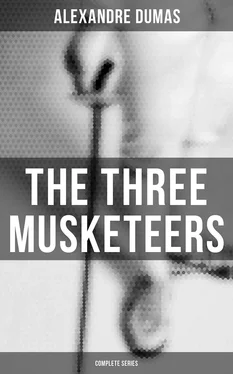“M. d’Artagnan, of the king’s Guards, company Dessessart, is expected at the Palais-Cardinal this evening, at eight o’clock.
“La Houdiniere, CAPTAIN OF THE GUARDS”
“The devil!” said Athos; “here’s a rendezvous much more serious than the other.”
“I will go to the second after attending the first,” said d’Artagnan. “One is for seven o’clock, and the other for eight; there will be time for both.”
“Hum! I would not go at all,” said Aramis. “A gallant knight cannot decline a rendezvous with a lady; but a prudent gentleman may excuse himself from not waiting on his Eminence, particularly when he has reason to believe he is not invited to make his compliments.”
“I am of Aramis’s opinion,” said Porthos.
“Gentlemen,” replied d’Artagnan, “I have already received by Monsieur de Cavois a similar invitation from his Eminence. I neglected it, and on the morrow a serious misfortune happened to me—Constance disappeared. Whatever may ensue, I will go.”
“If you are determined,” said Athos, “do so.”
“But the Bastille?” said Aramis.
“Bah! you will get me out if they put me there,” said d’Artagnan.
“To be sure we will,” replied Aramis and Porthos, with admirable promptness and decision, as if that were the simplest thing in the world, “to be sure we will get you out; but meantime, as we are to set off the day after tomorrow, you would do much better not to risk this Bastille.”
“Let us do better than that,” said Athos; “do not let us leave him during the whole evening. Let each of us wait at a gate of the palace with three Musketeers behind him; if we see a close carriage, at all suspicious in appearance, come out, let us fall upon it. It is a long time since we have had a skirmish with the Guards of Monsieur the Cardinal; Monsieur de Treville must think us dead.”
“To a certainty, Athos,” said Aramis, “you were meant to be a general of the army! What do you think of the plan, gentlemen?”
“Admirable!” replied the young men in chorus.
“Well,” said Porthos, “I will run to the hotel, and engage our comrades to hold themselves in readiness by eight o’clock; the rendezvous, the Place du Palais-Cardinal. Meantime, you see that the lackeys saddle the horses.”
“I have no horse,” said d’Artagnan; “but that is of no consequence, I can take one of Monsieur de Treville’s.”
“That is not worth while,” said Aramis, “you can have one of mine.”
“One of yours! how many have you, then?” asked d’Artagnan.
“Three,” replied Aramis, smiling.
“Certes,” cried Athos, “you are the best-mounted poet of France or Navarre.”
“Well, my dear Aramis, you don’t want three horses? I cannot comprehend what induced you to buy three!”
“Therefore I only purchased two,” said Aramis.
“The third, then, fell from the clouds, I suppose?”
“No, the third was brought to me this very morning by a groom out of livery, who would not tell me in whose service he was, and who said he had received orders from his master.”
“Or his mistress,” interrupted d’Artagnan.
“That makes no difference,” said Aramis, coloring; “and who affirmed, as I said, that he had received orders from his master or mistress to place the horse in my stable, without informing me whence it came.”
“It is only to poets that such things happen,” said Athos, gravely.
“Well, in that case, we can manage famously,” said d’Artagnan; “which of the two horses will you ride—that which you bought or the one that was given to you?”
“That which was given to me, assuredly. You cannot for a moment imagine, d’Artagnan, that I would commit such an offense toward—”
“The unknown giver,” interrupted d’Artagnan.
“Or the mysterious benefactress,” said Athos.
“The one you bought will then become useless to you?”
“Nearly so.”
“And you selected it yourself?”
“With the greatest care. The safety of the horseman, you know, depends almost always upon the goodness of his horse.”
“Well, transfer it to me at the price it cost you?”
“I was going to make you the offer, my dear d’Artagnan, giving you all the time necessary for repaying me such a trifle.”
“How much did it cost you?”
“Eight hundred livres.”
“Here are forty double pistoles, my dear friend,” said d’Artagnan, taking the sum from his pocket; “I know that is the coin in which you were paid for your poems.”
“You are rich, then?” said Aramis.
“Rich? Richest, my dear fellow!”
And d’Artagnan chinked the remainder of his pistoles in his pocket.
“Send your saddle, then, to the hotel of the Musketeers, and your horse can be brought back with ours.”
“Very well; but it is already five o’clock, so make haste.”
A quarter of an hour afterward Porthos appeared at the end of the Rue Ferou on a very handsome genet. Mousqueton followed him upon an Auvergne horse, small but very handsome. Porthos was resplendent with joy and pride.
At the same time, Aramis made his appearance at the other end of the street upon a superb English charger. Bazin followed him upon a roan, holding by the halter a vigorous Mecklenburg horse; this was d’Artagnan mount.
The two Musketeers met at the gate. Athos and d’Artagnan watched their approach from the window.
“The devil!” cried Aramis, “you have a magnificent horse there, Porthos.”
“Yes,” replied Porthos, “it is the one that ought to have been sent to me at first. A bad joke of the husband’s substituted the other; but the husband has been punished since, and I have obtained full satisfaction.”
Planchet and Grimaud appeared in their turn, leading their masters’ steeds. D’Artagnan and Athos put themselves into saddle with their companions, and all four set forward; Athos upon a horse he owed to a woman, Aramis on a horse he owed to his mistress, Porthos on a horse he owed to his procurator’s wife, and d’Artagnan on a horse he owed to his good fortune—the best mistress possible.
The lackeys followed.
As Porthos had foreseen, the cavalcade produced a good effect; and if Mme. Coquenard had met Porthos and seen what a superb appearance he made upon his handsome Spanish genet, she would not have regretted the bleeding she had inflicted upon the strongbox of her husband.
Near the Louvre the four friends met with M. de Treville, who was returning from St. Germain; he stopped them to offer his compliments upon their appointments, which in an instant drew round them a hundred gapers.
D’Artagnan profited by the circumstance to speak to M. de Treville of the letter with the great red seal and the cardinal’s arms. It is well understood that he did not breathe a word about the other.
M. de Treville approved of the resolution he had adopted, and assured him that if on the morrow he did not appear, he himself would undertake to find him, let him be where he might.
At this moment the clock of La Samaritaine struck six; the four friends pleaded an engagement, and took leave of M. de Treville.
A short gallop brought them to the road of Chaillot; the day began to decline, carriages were passing and repassing. d’Artagnan, keeping at some distance from his friends, darted a scrutinizing glance into every carriage that appeared, but saw no face with which he was acquainted.
At length, after waiting a quarter of an hour and just as twilight was beginning to thicken, a carriage appeared, coming at a quick pace on the road of Sevres. A presentiment instantly told d’Artagnan that this carriage contained the person who had appointed the rendezvous; the young man was himself astonished to find his heart beat so violently. Almost instantly a female head was put out at the window, with two fingers placed upon her mouth, either to enjoin silence or to send him a kiss. D’Artagnan uttered a slight cry of joy; this woman, or rather this apparition—for the carriage passed with the rapidity of a vision—was Mme. Bonacieux.
Читать дальше












